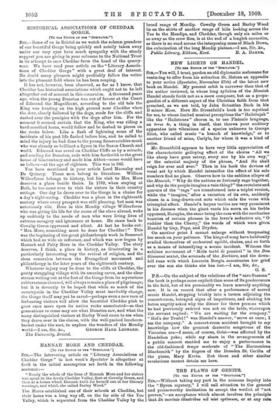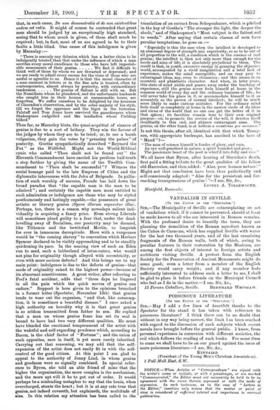THE FLAWS OF GENIU&
pro rim EDITOR Or THE " SPECTATOR:1 SIE,—Without taking any part in the noisome inquiry into the "Byron mystery," I will call attention to the genera/ and praiseworthy inclination to accept the verdict of "not proven,"—an acceptance which almost involves the principle that De tnortuis illustribus nil nisi optimum, or at any rate that, in such cases, De non demonstratis et de non existentibus eadem est ratio. It might of course be contended that great men should be judged by an exceptionally high standard,
seeing that to whom much is given, of them shall much be required ; but, in fact, most of us are agreed to be to their faults a little blind. One cause of this indulgence is given by Macaulay :—
"There is scarcely any delusion which has a better claim to be indulgently treated than that under the influence of which a man ascribes every moral excellence to those who have left imperish-
able monuments of their genius We find it difficult to think well of those by whom we are thwarted or depressed; and we are ready to admit every excuse for the vices of those who are useful or agreeble to us. Hence it is that the moral character of a man eminent in letters or in the fine arts is treated, often by contemporaries, almost always by posterity, with extraordinary tenderness The genius of Sallust is still with us. But the Numidians whom he plundered, and the unfortunate husbands who caught him in their houses at unseasonable hours, are forgotten. We suffer ourselves to be delighted by the keenness of Clarendon's observation, and by the sober majesty of his style, till we forget the oppressor and the bigot in the historian. Falstaff and Tom Jones have survived the gamekeepers whom Shakespeare cudgelled and the landladies whom Fielding bilked."
Thus far, as Macaulay hints, the quasi-acquittal of sinners of genius is due to a sort of bribery. They win the favour of the judges by whom they are to be tried; or, to use a harsh
vulgarism, they gain the votes by "greasing the palms" of posterity. Goethe sympathetically described " Reynard the Fox" as the Weltbibel. Might not the World-Biblical
cynic who called "Thou shalt not be found out" the Eleventh Commandment have carried his perilous half-truth a step further by giving the name of the Twelfth Com- mandment to "Thou shalt be successful "? Witness the social homage paid to the late Empress of China and the diplomatic intercourse with the Jebu of Belgrade. In pallia- tion of such worship of success, Froude has laid down the broad paradox that "the capable man is the man to be admired " ; and certainly the capable men most entitled to such admiration or indulgence are those who may be styled
posthumously and lastingly capable,—the possessors of great artistic or literary genius (Opera illorum sequuntur illos).
Perhaps, too, there is a reason why nowadays salient indi- viduality is acquiring a fancy price. Even strong Liberals will sometimes plead guilty to a fear that, under the dead- levelling sway of Socialism, our posterity may be doomed, like Tithonus and the bewitched Merlin, to languish for ever in innocuous decrepitude. Here with a vengeance would be "the coming slavery" to convention which Herbert Spencer declared to be visibly approaching and to be steadily quickening its pace. In the nearing view of such an Eden run to seed, such a lubberland of lotus-eaters, who would not pine for originality though alloyed with eccentricity, or even with more serious defects P And this brings me to my main point: indulgence is due to the defects of 'genius—that mode of originality raised to the highest power—because of its abnormal sensitiveness. A great writer, after referring to Peel's fatal accident, adds that "three days he lingered in all the pain which the quick nerves of genius can
endure." Support is here given to the opinions broached in a former letter (Spectator, November 13th) that genius
tends to wear out the organism, "and that, like consump- tion, it is sometimes a beautiful disease." I once asked a high authority on heredity why it is that great genius is so seldom transmitted from father to son. He replied that a man on whose genius fame has set its seal is bound to have had two very different qualities. He must have blended the emotional temperament of the artist with the wakeful and self-regarding prudence which, according to Bacon, is the chief factor of " Fortune " ; and the union of such opposites, rare in itself, is yet more rarely inherited.
Carrying out that reasoning, we may add that the self- expansion of the artist does not easily fit in with the self- control of the good citizen. At this point I am glad to appeal to the authority of Jenny Lind, in whom genius and goodness were so signally combined. In special refer- ence to Byron, she told an able friend of mine that the higher the organisation, the more complex is the mechanism,
and the more apt will it be to get out of order. It would perhaps be a misleading metaphor to say that the brain, when overcharged, stunts the heart ; but it is at any rate true that genius, not indeed covereth, but explaineth, the multitude of sins. In this relation my attention has been called to the translation of an extract from Schopenhauer, which is pitched in the key of Goethe's "The stronger the light, the deeper the shade," and of Shakespeare's "Most subject is the fattest soil to weeds.", After saying that certain classes of men have peculiar temptations, he goes on "Especially is this the case when the intellect is developed to an abnormal degree of strength and superiority, so as to he out of all proportion to the will, a condition which is the essence of real genius; the intellect is then not only more than enough for the needs and aims of life, it is absolutely prejudicial to them. The result is that, in youth, excessive energy in grasping the objective world, accompanied by a vivid imagination and a total lack of experience, makes the mind susceptible, and an easy prey to extravagant ideas, nay, even to chimaeras ; and this issues in an eccentric and phantastic character. And when, in later -years, this state of mind yields and passes away under the teaching of experience, still the genius never feels himself at hone in the common world of every day and the ordinary business of life ; he will never take his place in it, or accommodate himself to it as accurately as the person of normal intellect ; he will be much more likely to make curious mistakes. For the ordinary mind feels itself so completely at home in the narrow circle of its ideas and views of the world that no one can get the better of it in that sphere; its faculties remain true to their own original purpose vie, to promote the service of the will, it devotes itself steadfastly to this end, and abjures extravagant aims. The genius, on the other hand, is at bottom a monstrum per excessum."
Is not this thesis, after all, identical with that which Tenny- son, with appropriate burlesque, has ascribed to the hero of "Maud "?—
"The man of science himself is fonder of glory, and vain,
An eye well-practised in nature, a spirit bounded and poor ; The passionate heart of the poet is whirl'd into folly and vice."
We all know that Byron, after hearing of Sheridan's death, first paid a fitting tribute to the great qualities of his fellow old-Harrovian, and then added : "Alas, poor human nature !" Might not that conclusion have been thus pathetically and. self-consciously adapted: "Alas for the persistent and far- reaching transgressions of genius ! "—I am, Sir, &c., LIONEL A. TOLLEMACNE.
MoaVeld, Boscombe.



















































 Previous page
Previous page